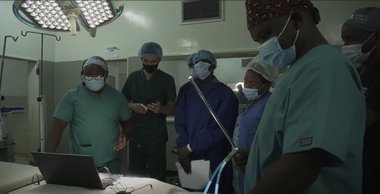29 June 2022
Volunteers from across King’s Health Partners (KHP) recently visited Zambia to help hospitals improve care for mothers and their babies.
Too many mothers and newborn babies still die from preventable complications in Zambian hospitals due to a lack of trained health workers, inadequate equipment, and delayed referrals. The neonatal mortality rate in Zambia shows a negative trend with 23 deaths per 1,000 live births. In comparison, this number in the UK is less than three. Maternal mortality rates are also high in Zambia, with 183 deaths per 100,000 live births. In the UK, this figure is below ten.
King’s Global Health Partnerships (KGHP) was awarded a grant from the James Percy Foundation to address this challenge in the Copperbelt Region of Zambia. Working with its Zambian partners – the Ndola Teaching Hospital (NTH) and the Arthur Davison Children’s Hospital (ADCH) – the Partnership is aiming to improve the quality of care at primary health care level and increase the number of safe referrals to more specialist care, thereby improving chances of survival of mothers and new-borns.
 Recently, a Leadership and Mentoring Group, including staff volunteers from across KHP, visited Zambia to deliver training to nurses, midwives, and clinical officers at primary healthcare facilities. KHP Comms Officer Henry Lockyer spoke to one of the volunteers Jenny Somer, Ward Manager, Evelina London Children’s Hospital, to hear more about the project and the training provided by the Leadership and Mentoring Group:
Recently, a Leadership and Mentoring Group, including staff volunteers from across KHP, visited Zambia to deliver training to nurses, midwives, and clinical officers at primary healthcare facilities. KHP Comms Officer Henry Lockyer spoke to one of the volunteers Jenny Somer, Ward Manager, Evelina London Children’s Hospital, to hear more about the project and the training provided by the Leadership and Mentoring Group:
Please describe the maternal and neonatal care project in Zambia
In Zambia, mothers regularly give birth in primary healthcare facilities. It is in these locations where complications can occur. Antenatal support is insufficient, and there is a lack of adequately trained staff, and equipment. In addition, poor communication and late referrals to tertiary hospitals mean that mothers and babies do not access safe and appropriate care when they need it the most. This project therefore focuses on improving the quality of care in primary healthcare facilities and supporting safer referrals through enhanced communication. This will be achieved by training master trainers from eleven off track primary healthcare facilities to deliver and cascade training of context-appropriate maternal and neonatal courses. In addition, they will be provided with leadership training to develop their skills, and will be supported from mentors selected from two tertiary hospitals.
How is the leadership and mentoring group supporting this work? What will the training involve?
 The leadership and mentorship group is supporting this work by engaging with selected clinicians from NTH and ADCH and providing them with a framework to mentor and support identified master trainers from within the eleven primary healthcare facilities. The knowledge, skills, and confidence gained will enable the primary health care facilities to cascade their maternal and neonatal training effectively, and provide them with a supportive environment, promoting a culture of good practice.
The leadership and mentorship group is supporting this work by engaging with selected clinicians from NTH and ADCH and providing them with a framework to mentor and support identified master trainers from within the eleven primary healthcare facilities. The knowledge, skills, and confidence gained will enable the primary health care facilities to cascade their maternal and neonatal training effectively, and provide them with a supportive environment, promoting a culture of good practice.
The mentorship training provided definitions and a theoretical basis, whilst giving plenty of opportunities to practice a number of tools in a simulated environment. A number of themes and skills were covered, including the GROW model, SMART objectives, as well as action learning sets that will be used throughout this mentorship process. This training engaged participants through several group-based and interactive sessions, supported by a comprehensive handbook that can be used as a future resource.
What will the impact of your work be for improving outcomes for mothers and newborn babies in Zambia?
 The impact of our work will be felt at a number of levels. In supporting a mentorship system, health workers within the primary health care facility will be given a structure to encourage their own professional development. They will be supported to develop new ways of working which prioritise teamwork and communication. These improvements will be built around service delivery and clinical improvement, therefore mothers and babies who arrive at primary healthcare facilities should experience the positive effects of this.
The impact of our work will be felt at a number of levels. In supporting a mentorship system, health workers within the primary health care facility will be given a structure to encourage their own professional development. They will be supported to develop new ways of working which prioritise teamwork and communication. These improvements will be built around service delivery and clinical improvement, therefore mothers and babies who arrive at primary healthcare facilities should experience the positive effects of this.
In Zambia with King's Global Health Partnerships - YouTube
Interested in volunteering with KGHP? The Partnership is currently looking for a Health Data Management Lead Volunteer and Surgical Lead Volunteer in the Democratic Republic of Congo (remote and in-country placement) to support its Safe Surgery programme. See the Terms of Reference and apply here.





